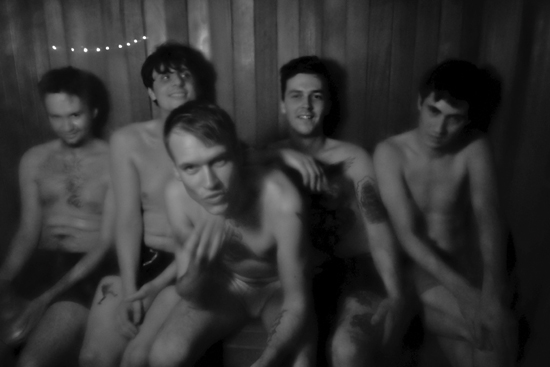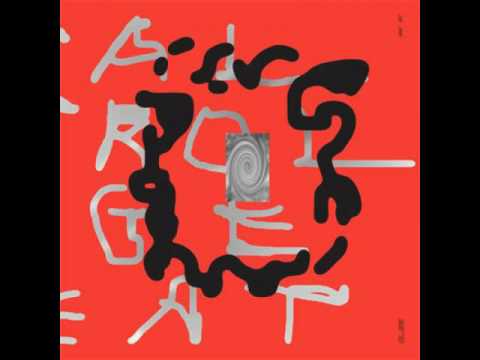Mostly punk with a dash of electronica added to the mix, Total Control comprises five members from the diverse punk and DIY community of Melbourne, Australia. When founders Mikey Young and Daniel Stewart dreamed up the band in 2008, everything from The Screamers to Gary Numan surfaced as an influence before they laid down a recording in Young’s studio, only to be carried off in the current of life as an itinerant musician.
Stewart went back to touring and recording with his respective hardcore and punk outfits Straight Jacket Nation and UV Race, Young to his hugely popular elemental garage rock band Eddy Current Suppression Ring and a burgeoning career in sound production. Since then, Total Control has dropped only three 7” singles, played a handful of shows and achieved cult status among some circles, while also appealing to the odd Italo-disco dabbler. But it wasn’t until their debut album Henge Beat, an invitation to next week’s All Tomorrow’s Parties Festival in Minehead and a US tour with Thee Oh Sees that the band has found time to be just that, a band.
Total Control could potentially be perceived as a slightly rough-edged sum of its parts, attempting to marry their roughly hewn punk present with an interest in synthesisers. But Henge Beat manages inexplicably to combine the minimal dance vibe of early 7” releases like ‘Paranoid Video’ and ‘Pyre Island’ with the focussed aggressive racket of their hitherto rare live performances. Stewart’s lyrical cadence and dry vocal, meanwhile, toes the bleak thematic line of a band uniquely of its time. When we spoke to Stewart, mouthpiece for the provisional band that is Total Control, he contemplated the future, the apocalypse and what he really means by saying “these are not the last days”.
Do you think Total Control allows you to explore ideas that your other bands don’t?
Daniel Stewart: I think all of the bands are vital and continue to develop in different ways. What I really like about Straight Jacket Nation is that it’s a hardcore band that doesn’t pretend to be anything; like a band that’s rooted in the sound of hardcore. We don’t really attempt to develop the idea from where it’s been developed and we try to explore its limits, whereas UV [Race] doesn’t really have that aspect to it. It’s far more adventurous and playful. Total Control is something completely different, I don’t even know how to explain it.
When I first listened to Henge Beat, what sprung to mind was Carl Sagan’s Cosmos series where the soundtrack had this cheesy synth sound going on. He was talking about these really exciting possibilities in the 70s and now they’re dead – even he’s dead – that sadness is something I think comes through on the record.
DS: I guess it was something I hadn’t thought about a lot, but Phillip K. Dick did the same thing. He was writing about the future at a time where the majority of people were getting really excited; about walking on the moon, flying through the air and stuff. His take on it was basically projecting the current politics and the way people were interacting with the future and saying, ‘Let’s look at how people are and let’s see what’s going to happen in the next 50 years, when we have more control over the way people live.’ I really responded to that when I first read it and that was around the same time that we started doing the demo. I was thinking about his writing and the stuff that came out of it.
It’s weird because it feels like, back in those days, it was more of a positive thing, thinking about the future, but now it’s actually a bit terrifying.
DS: Yeah, I think [it happened] around ten years ago, as soon as the decade turned over. It seems corny but I do think, with the last decade of war and constant terrorist fears, people don’t think the future is getting better. I guess maybe in the 90s we had some rosy-cheeked ideal but definitely not now, people are just terrified.
Maybe the seeds of doubt were planted during Y2K.
DS: You know, I think there was a bit of disappointment there that the Y2K bug didn’t work.
Well, from the last song on the album [‘Love Performance’], I got the impression that you’re saying the only hope is in the end of the world.
DS: No, actually, I guess what I was thinking about when we were putting the record together was really quite bleak. At the time I was reading Nietzsche all across summer for my honours thesis. I was hanging around with Nietzsche four or five days a week, just trying to get all his stuff read so I could get this thesis done before we went on tour and I was just feeling really caged in. Have you read much of him?
Yes, and I got really depressed.
DS: He’s a tough person to read and his entire thing is just very, very bleak, you know. I was reading this all through summer; I was sitting inside while we were putting the lyrics together for the record and I was like, ‘I don’t want this record to comes across as another contribution to the general theorem of, like, apocalyptic fantasies’ and those kinds of things. Because I think that every generation likes to imagine that it’s the last generation; like the constant fear of nuclear war, in the 60s and 70s, even into the 80s, with the Cold War.
Every generation likes to think, ‘All right, there’s going to be some super-bug that’s going to wipe out the human population and I’m living in the last generation,’ even when you look back throughout the last thousands of years. What I really wanted to say was that this is so narcissistic, this fantasy that we’re the last people that are going to experience human thought or whatever. It’s just a pattern of human culture that continually generates this terror that our death represents the death of everything. It’s ridiculous.
I guess in the middle ages it was God that was going to smite everyone and end the world.
DS: Yeah and people believed it very strongly. The plague was seen as, ‘All right, it’s final and it’s here, the end of human endeavour’, you know, ‘Europe is going under’. You look across other cultures and there’s this constant fear too. It’s just a strange aspect of human life.
I guess, to try and understand it better than I have, I’d have to look into it being some kind of psychological response to death.
It’s like some kind of moral check, as well. Nowadays it’s all about the environment and recycling.
DS: Totally, there are definitely people from every aspect of the political spectrum where that idea and that fear is so exploited and people just respond to it in the most insane ways. It’s always on my mind. Like you said, recycling is some kind of benign activity where you put your bottle in the bin because people are told that if they don’t do it their children will die.
Talking about Philip K. Dick, I’ve noticed a strong reverence to his work in alternative culture. Do you think that fascination with apocalyptic fantasies has something to do with the ‘us against the world’ code of punk and hardcore that draws those groups to it in the first place?
DS: Yeah, I guess it’s the actual sound of a loud guitar and drums bashing. That actual sound does not appeal to that many people, really. So if you like that particular sound you will create a vast mythology to justify why that sound is superior to other sounds because it might make you just feel better about yourself. Because not only does that sound, sound good to you but that sound is the right sound to listen to. Does that make sense?
Yeah, I think you’re making a valid point.
DS: It’s like anything. People want to feel like their taste is not just a particular preference for whatever reason. I think they like to think, ‘my taste is this because this is actually the superior and most beautiful thing that exists’ and I don’t think that there’s any real way of justifying that at all.
I think that when you get these niche interests like a loud, obnoxious guitar, loud obnoxious politics, or loud obnoxious aesthetics, go along with it. I wonder why it does get to where loud guitars and drumming need to go along with anti-homophobic politics; or loud guitars and drumming should only be played by people who don’t eat meat, because that’s how it went for a while and that’s how it could continue to go. Other people think that loud guitars and drumming should not be played by anyone other than a man, you know, people think that.
As a journalist, I understand that ongoing dilemma of whether intellectualising an art form is, in fact, necessary.
DS: Yeah sure, but when you get down to it, intellectualising for a lot of people – you and I included, I assume – is just kind of fun. It gives you stuff to think about and enriches the experience and that’s the way you do things.
I don’t think anything is beyond being intellectualised. As long as it doesn’t rob you of the reason you approached it in the first place, that you responded to it on a gut level, I guess. That’s why I don’t really intellectualise or respond strongly to drum & bass. If I loved it, maybe I would.
Total Control play the Les Savy Fav-curated day at ATP’s Nightmare Before Christmas this weekend, 9-11 December
Photo: Pedey Dammit



